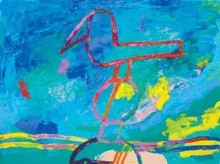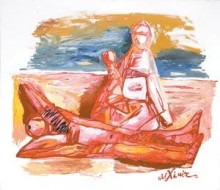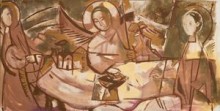This may be an inherited feature, as Mykhailo is the son of the Ukrainian architect and artist Yurii Khymych, who is known for his Kyiv landscapes. In the world of art Mykhailo Khymych is an experimenter who combines ceramics and painting. However, most of those who know his name associate it with the original artistic-social project “Piatykhatky” [from five houses in Ukrainian – Ed.]. This is a kind of modern eco-commune, and it is Mykhailo’s architectural and ideological brainchild. Two years ago the construction of the project “Piatykhatky” started on the territory of a private area in the village Berkivtsi. It was planned as a big clay sculpture, provided with electricity and plumbing and suitable for life. The five houses (hence the name) and a hothouse are located along the perimeter of a rectangular plot with an area of 300 square meters and create a yard, covered with shale. The construction resembles a decorative fortress. The walls are pierced with windows, placed in a chaotic way, and fixed-in glass packets. Every house has two floors, spiral stairs, a kitchen, bathroom units, a living room, a wood stove to cook food and heat the house, a fireplace, and one or two rooms for recreation (second floor). Only ecologically safe materials were used while building the “khatky” as well as the remains of building materials from the nearby construction sites (broken bricks, parts of ceramic slate, the remains of glass packets).
The “Piatykhatky” was created early this year. Recently the small gallery of the Art Arsenal opened an exhibit of Khymych’s paintings, marking a new stage in the artist’s creative work — with monumental scale (the exposition displays over 30 works of broad format), expression, and uninhibited work with pure colors.
The Day took advantage of the occasion to interview the artist about his projects and memories, about his father and Serhii Krymsky, whom Mykhailo happened to know.
You created the “Piatykhatky” project over six months ago. Do you think it’s a success?
“This project could not be a failure, because I did not link any expectations with it. Thus, I am fully satisfied with the results. When people moved to these houses, I set them only one condition, to teach their neighbors some craft. Now very good people live there. On the whole, ‘Piatykhatky’ is a good example of how one can do something good and useful instead of wasting money on food, clothes, or a Chinese jeep. I spent it on a more interesting and amazing thing, which I had to do myself — the construction of a house.”
Is the change of space, in which we currently live, so important and necessary?
“I did not set such an objective when I painted pictures on city walls. I don’t understand why they became so famous. Those pictures, like my entire creative work, have only one aim, communication. And it does not matter what the end result is: a picture on an Obolon boiler house, ‘Piatykhatky’ or a series of paintings. On the whole, I have understood this recently, you should create new pictures only for your friends. Create them for someone, do you understand me? I have a boundless interest for communication with the help of paint and clay.”
We know that you were acquainted with Serhii Krymsky, who can be called without exaggeration The Day’s teacher. Do you have any memories connected with him?
“Many people knew Krymsky, I can hardly say that he knew me. When he left the room of the Kyiv-Mohyla Academy, where he delivered lectures, everyone knew him, but I don’t know whether he distinguished anyone in the crowd of students. I can say that he was a kind of person, whom you can meet in the street and start a very interesting conversation with. We spoke several times, and I have only warm memories about those talks.”
What are the brightest memories you have of your father, the renowned Ukrainian graphic artist Yurii Khymych?
“There are plenty of them. He was a phenomenal person, a wonderful, light and warm person, with a much higher level than me. He was a talented pedagogue and graphic artist. Besides, he had incredible artistic feeling, a very good ear, understanding of people who draw, and very broad horizons. My father had a good nose for talented people. I was always impressed by this. I think you won’t be mistaken if you place Yurii Khymych in one row with the aforesaid Serhii Krymsky, and others, no less outstanding people, like Hryhorii Yakutovych, Hryhorii Khoroshylov and many others.”









